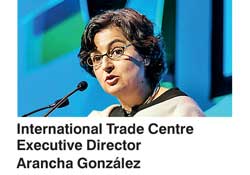Friday Feb 20, 2026
Friday Feb 20, 2026
Thursday, 26 October 2017 00:00 - - {{hitsCtrl.values.hits}}
World Export Development Forum 2017 co-host ITC Executive Director Arancha González yesterday declared that trade had helped reduce poverty globally and support for SMEs was at the heart of making economies more inclusive.
Speaking at the opening of WEDF in Budapest which has drawn over 500 delegates, she said that countries from Canada to China, and Chile to Kenya, had used open global markets to drive growth and reduce poverty, in turn creating opportunities elsewhere in the world.
“Today, the share of humans living in extreme poverty is lower than it has ever been. Open markets, anchored in the rules-based multilateral system are an important part of this story,” she stressed.
The ITC official also said trade was not an end in itself but an important tool for the productivity of businesses, the competitiveness of national economies, and for growth, value addition, and job creation. “Giving up this tool, by closing markets, would diminish growth and opportunities for future generations,” she added.
“The real question is not trade: yes or no? It is not about whether to trade. It is about how to make trade work for the 99%. It is about how to make trade work for more inclusive growth, for environmental sustainability and for shared prosperity. Because even though trade has enriched us, many have not shared in this progress. Large groups of society have been left out of the gains. Many developing countries remain on the margins of international value chains, supplying unprocessed raw materials if anything at all,” ITC’s Gonzalez said.
She also said apart from supportive trade policies, domestic social, labour, and education policies had often fallen short. She was of the view that too frequently they have failed to equip people with the skills, rights, and safety nets needed to cope with the fast pace of technological change and global competition.
Stressing that trade policy could help, Gonzalez pointing to the ITC’s new flagship research report, the ‘SME Competitiveness Outlook,’ said there was evidence that trade and investment agreements could be good for inclusive growth. It offers concrete suggestions on how to amplify these positive effects.
She also told the WEDF opening that Micro, Small and Medium Enterprises (MSMEs) were at the heart of making our economies more inclusive.
Because MSMEs account for the vast majority of businesses and job creation, Gonzalez said the more that they were able to increase competitiveness and connect to the global economy, the more the gains from trade would be broadly shared across society.
“There are concrete steps that governments, businesses, and others can take to help MSMEs internationalise and add value,” the ITC Executive Director stressed.